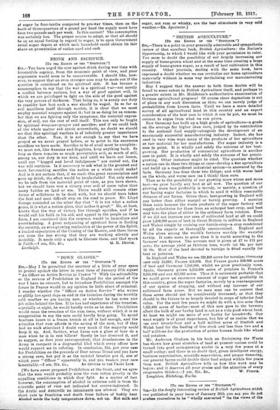" BRITISH AGRICULTURE."
(To TER EDITOR or THE " SPECTATOR."3
Sm.—There is a point in your generally admirable and sympathetic: review of that excellent book, British Agriculture: the Nation's Opportunity, to which I would like with your permission to refer. You seem to doubt the possibility of our largely increasing our supply of home-grown wheat and at the same time creating a large supply of home-grown sugar, as a result of beet cultivation in this country. Other journals, dealing with the same book, have expressed a doubt whether we can revitalize our home agriculture materially without in some way devitalizing our manufacturing industries.
May I suggest that the answer to both these doubts will be found to some extent in British Agriculture-itself, and perhaps to a greater extent in Mr. Middleton's authoritative examination of German agricultural progress? Of course sheer degmatism is out of place in any such discussion as this; wo can merely judge of probabilities from known facts. Until we have a more detailed survey of all agricultural land in this country and an expert consideration of the best uses to which it can be put, we must be content to argue from what we can prove.
Now Germany has built up a high grade of agriculture—a grade on the average far higher than ours, judged by its contribution to the national food supply—alongside the development of an enormously successful manufacturing industry. Indeed, she has used in very wise ways many of the products of her agriculture as raw material for her manufactures. Her sugar industry is a case in point. It is wholly and solely the outcome of her hed- ge owing. Her production of commercial agriculture is another case in point. It is wholly and solely the outcome of her pothen- growing. Other instances might be cited. The question whether a nation can do these two things at once—develop a fine agriculture and build up a magnificent industrial system—is answered by the facts.. Germany has done these two things;, and with worse land on the whole, and worse men (as I think) than ours.
Then as to the possibility of our growing more wheat and more beet—we grow hardly any beet at all now. The question of our growing more beet profitably is merely, or mainly, a question of our having sugar factories to which to send it within reasonable distance of our farms. Given these, beet-growing in England will pay better than either mange] or turnip growing. I mention those roots because the waste products of the sugar factory will supply substitutes for them from an enlarged beet crop; and beet may take the place of either in the ordinary farm rotation. Even if we did not increase our area of cultivated land at all we could grow 1,350,000 acres of beet in Great Britain (a million in England and Wales) simply by excising our turnip-crop—a crop condemned by all the experts as thoroughly uneconomical. England and Wales alone among the world's farmers worship the wasteful turnip. It costs more to grow than it is worth according to the farmers' own figures. The average cost is given at £7 to £13 per acre; the average yield as thirteen tons, worth (at les. per ton) £6 10s. ',Jest of the land devoted to turnips is fitted equally for beet or potatoes.
In England and Wales we use 938,000 acres for turnips; Germany uses only £5,003; France 480,000. But France grows 630.000 acres of beet and Germany 1,246,000. whilst we grow practically none. Again, Germany grows 8,2:53,000 acres of potatoes to France's 3,851.000 and our 427,000 acres. Thus it is extremely probable that we could grow an enormous amount of sugar heat profitably in
this country, given the sugar factories, merely by a rearrangement of our system of cropping, and without any increase of our cultivated farm areas. But no sane man can be content that those areas should not be considerably increased; or that they should in the future be so largely devoted to crops of inferior food value. For the next few years we might do with a Ices area than 1,331,000 acres of barley—most of. this now goes to the brewer; albeit the bulk of our barley land is not as a rule good wheat land. At least we might use more of our barley for breadstuffs. Our meat supply is of great importance, but few of us realize that we nee over twenty-four and a half million acres of linglieb and Welsh land for the feeding of live stock and less than two and a half millions for the production of prime human foods like wheat and potatoes.
Mr. Anderson Graham in his book on Reclaiming the Waste has shown how great stretches of land at present useless could be turned into good corn-growing arable in a very few years at a small outlay: and there is no doubt that, given intelligent energy, business organization, scientific supervision, and proper financing, our present farms could double their food output within five years from now. British Agriculture tells us how this work may be begun; and it deserves all your praise and the attention of every
progressive thinker.—I am, Sir. &o., W. Loughton, Bletchley, Bucks.


































 Previous page
Previous page